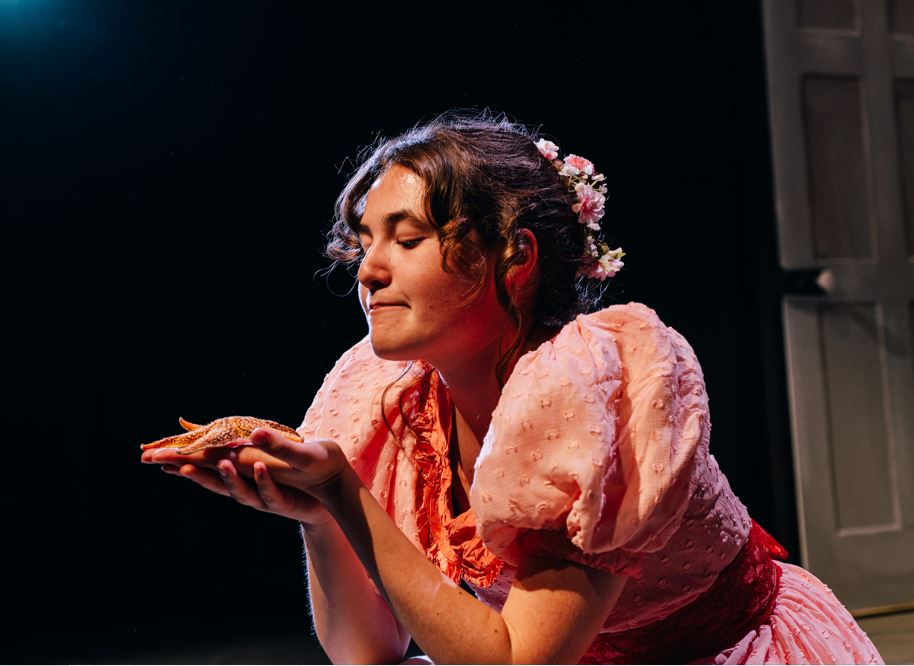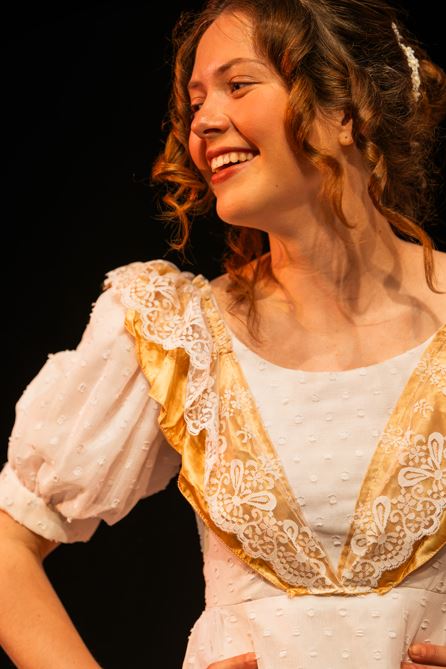Sense and Sensibility
Focus and Humour in Perspective
Sense and Sensibility
by Jane Austen, adapted by Jessica Swale
Putney Theatre Company at the Putney Arts Theatre until 24th June
Review by Vince Francis
I haven’t visited Putney Arts Theatre for a while now, and thus welcomed the opportunity to have a look at Putney Theatre Company’s production of Jane Austen’s Sense and Sensibility.
Sense and Sensibility was Jane Austen’s first novel, originally published anonymously in three volumes in 1811, which offers a commentary on middle-class society and, particularly, the position of women in the late 18th and early 19th centuries. However, such a dry summary does a disservice to the intricacies of the plot and the detailed observation of characters, hierarchies, and social mores, not to mention the wit, which became Austen’s particular trademarks.
In summary, the story centres around two sisters, Elinor and Marianne Dashwood, whose family become impoverished as a result of the bequest of the family home to their uncle, John, on the death of their father. John initially takes a sympathetic and generous view of the situation, but is met with the stern disapproval of his avaricious, socially climbing wife, Fanny and our heroines, their mother and younger sister, Margaret, together with the faithful retainer, Perks, are thus driven to leave their beloved Sussex for Devonshire, where they take up residence in a cottage, in reduced circumstances. It becomes apparent fairly early on that Elinor represents the ‘Sense’ of the title, in that she is naturally reserved, rational and cautious. Marianne, on the other hand is the ‘Sensibility’, romantic, a lover of poetry and music and open in her enthusiasm for life and love.
Without wishing to give away the whole plot, what follows features the stuttering relationship between Elinor and Edward Ferrars, in parallel with Marianne’s infatuation with John Willoughby, a seeming soulmate, contrasted with what she perceives as the boring security offered by the straight-laced and reserved, Colonel Brandon. Austen deftly utilises these plotlines, augmented by characters such as the younger sister, Margaret, and Mrs Jennings, a tireless local busybody and would be matchmaker, to make points about the position of women and their total dependency on a good marriage, and, where possible, poke a bit of fun at society in general.
With regard to the play, any adaptation of a novel will, by necessity need to edit some elements of the plot and even some characters and, perhaps lean toward some aspect or perspective. In this version, the characters are the focus and the humour in the writing is the perspective. That is not to say that the more serious messages, such as the availability and acceptability of respectable paid employment for women, are glossed over or edited out. Indeed, director Ben Clare makes this point in his excellent programme notes summary, using as an example the exchange between Elinor and Edward in which Edward expresses his desire to avoid a demanding position, prompting a riposte that reflects the yearning just for a choice in the matter.
Putney Theatre Company’s production demonstrates the wit of the piece excellently, with an accomplished delivery and a strong talent for character portrayal, rightfully appreciated by an enthusiastic and supportive audience.
It is difficult and possibly unfair to single out individuals in a strong ensemble piece such as this, but here goes. Emma Bugg and Olivia Jackson were well cast as the sisters Elinor and Marianne respectively, both giving strong and convincing performances. Great support, too, from Lois Savill as Mrs Palmer – an object lesson in comedy – and Hubert MacGreevy as Mr Palmer, her long-suffering husband, who gets few words in, but makes them count. Jamie Cameron as John Willoughby also provided a strong performance, particularly given that he was suffering from laryngitis. I wish him well soon, so that he can add even more shine to the role.
But, for me, there was a stand-out and that was Isabella Walsh-Whitfield as Margaret Dashwood. This was a soup-to-nuts feast of childhood energy, enthusiasm, and curiosity, providing a signal to the future of women in science through her interest in the natural world. Isabella never let up in her intensity on stage, and was here, there, and everywhere, including, at one point, holding one end of a clothesline up for some minutes whilst Elinor hangs laundry on it and has a discussion with Marianne. She’ll be shoulder pressing to Olympic standard by the end of the run, I’ll avow.
The production takes a straightforward approach to staging, using furniture and props mainly, which is appropriate to the venue and helps to keep the action rolling. This was generally well-managed by Will Hunter and Helen Wood, supported by what looked like an experienced crew and supplemented by cast members as appropriate. There were a couple of “noises off”, which were probably a result of first-night issues, but, overall, a slick operation which will get slicker during the run.
Lighting director Peter Rees has opted for an equally straightforward lighting plot, varying in intensity according to requirement (e.g., indoors to outdoors) and using subtle colouring to create atmosphere. Also, a nice use of blacking out stage areas to provide focus on particular characters or action, or to mask scenery shifts.
Barney Hart Dyke’s sound provided two elements that I thought were noteworthy. Firstly, the music. The choice of what sounded like a string quartet playing contemporary music provided a classy bridge between past and present. The choice of material and its placement in the action is, I think, beautifully considered. I particularly appreciated the version of Bonnie Tyler’s 1984 hit I Need A Hero. The second plaudit for this production’s soundscape is the use of ambient sounds, such as birdsong and waves breaking on a seashore. For me, this level of attention to detail adds significantly to a production, but often goes unacknowledged, so a gentle tip of the hat from yours truly.
In an otherwise very nicely designed and executed costume strategy, the only niggle for me here was the men’s boots. They seemed to have a wellie-like quality, which may, of course be intentional, but just didn’t quite look the part.
I enjoyed this production enormously and have no hesitation in saying that it’s well worth a look, even if you’re not an Austen aficionado, as is the case for me. Ben Clare’s direction is crisp and considered, pushing the action along at pace. The cast draw every ounce from their characters and the humour certainly helps to engage, although there was a small amber light blinking in my head at a couple of points that said we might be at risk of moving toward parody in places, one such example being the doctor’s visit to a fevered Marianne.
That aside, go see.
Vince Francis, June 2023
Photography by Steve Lippitt







Loved the play so charming
Loved Lois as Mrs Parmer
She lit up the room
Such fun